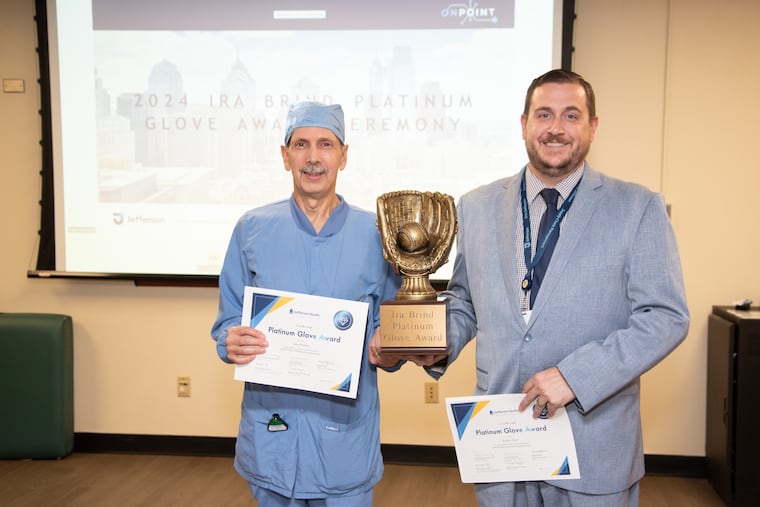Jefferson nurses reported a defective IV needle and contributed to a national recall. Jefferson wants more staffers to report potential problems.
The program is intended to make safety reporting a more visible part of the health system's culture.

John Paoletti and his nursing colleagues realized something was wrong with the needles used to start patients’ IV catheters: When they pulled the needle out of a patient’s arm, the needle didn’t retract properly.
Instead of moving back into the sheath designed to secure the used needle, so it wouldn’t prick anyone else, the sharp point bobbed loosely in and out of the plastic covering.
Paoletti, a charge nurse at Jefferson Torresdale Hospital, reported the problem internally, through the health system’s Great Catch program in 2023. The initiative encourages employees to report problems — big or small — with the goal of addressing potential safety issues before patients get hurt.
Paoletti’s report ultimately led to an investigation by the manufacturer, Becton Dickinson, and the U.S. Food and Drug Administration, and a recall of needles with defective springs.
Jefferson Health leadership point to the case as an example of how raising the alarm on seemingly small problems can lead to important safety improvements.
Great Catch launched in 2020 as a way to make safety reporting a more visible part of the health system’s culture. Staffers who report problems are routinely recognized during leadership and team meetings. In December, Paoletti and Bob Bayer, a supply chain manager who escalated the report to Jefferson’s manufacturing and distribution partners, were presented with a trophy with a bronzed baseball mitt.
“We’re trying to design a system where it’s easier to do the right thing and harder to do the wrong thing,” said Patricia Henwood, Jefferson’s chief clinical officer.
Health systems can only solve problems they know about. Every year, the Pennsylvania Department of Health investigates hundreds of anonymous complaints and safety lapses that hospital staff self-report. Jefferson’s hospitals were cited for problems such as inaccurate mammography result reading, loose power cords that could be a strangulation hazard, failing to recognize patients at risk of falling, and unsanitary patient rooms.
Still, many potential safety issues go unreported. Jefferson’s program seeks to address common reasons, like staff fears about being reprimanded for a mistake or singled out as part of the problem. At a system as large as Jefferson, some may feel the effort of reporting isn’t worthwhile, if they never see anything come of it, Henwood said.
Administrators say the Great Catch program is helping make progress: Between 2021 and 2024, 50% of reports involved a safety problem in which no patient was harmed, up from 30% before Great Catch started. In other words, more safety issues are being reported and fixed before anyone gets hurt.
From Jefferson supply closet to national recall
Paoletti and other nurses in the cardiac catheterization laboratory at Jefferson Torresdale first noticed a problem with their IV needles in August 2023.
He checked the supply cabinet and found the entire stock of IV needles was from the same lot number, meaning they could potentially all have the same problem.
He reported it immediately. As charge nurse, Paoletti is responsible for managing a team of nurses, making sure they have the supplies they need and setting an example for how to handle problems. He said it is important for others under his supervision to see that he takes their concerns seriously and makes the effort to report any potential problems.
“It’s not like you’re pointing fingers or beating up on someone — you’re just doing what’s best,” Paoletti said.
Paoletti said he didn’t think twice about reporting the problem. But getting staff to make safety reports about an issue that hasn’t actually harmed a patient (yet) can be challenging, Henwood said.
Filing incident reports through Jefferson’s online system takes time away from patient care for busy medical providers. That’s why the system is making a bigger effort to encourage reporting, communicate changes that result from those reports, and publicly applaud staffers who speak up when they see something that isn’t working.
“It’s important for our teams to not just say, ‘Oh, this isn’t working,’ and move on,” Henwood said.